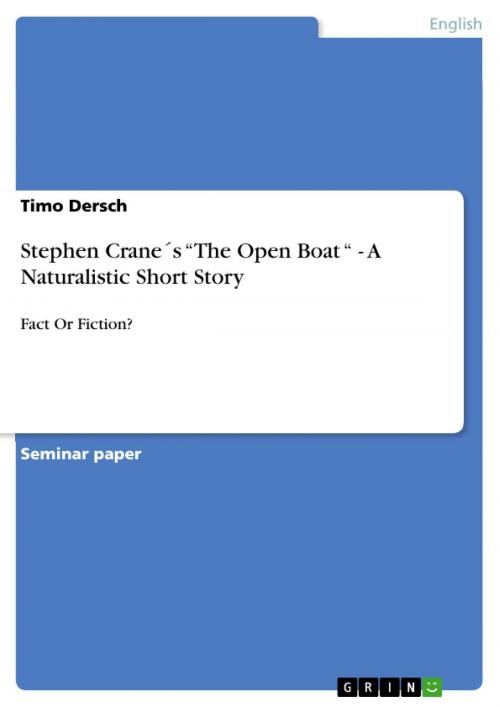Stephen Crane´s 'The Open Boat ' - A Naturalistic Short Story
Fact Or Fiction?
Fiction & Literature, Literary Theory & Criticism, British| Author: | Timo Dersch | ISBN: | 9783640740789 |
| Publisher: | GRIN Publishing | Publication: | November 3, 2010 |
| Imprint: | GRIN Publishing | Language: | English |
| Author: | Timo Dersch |
| ISBN: | 9783640740789 |
| Publisher: | GRIN Publishing |
| Publication: | November 3, 2010 |
| Imprint: | GRIN Publishing |
| Language: | English |
Seminar paper from the year 2010 in the subject English Language and Literature Studies - Literature, grade: 1,3, University of Stuttgart, course: G2, language: English, abstract: Stephen Crane, recognized by modern critics as one of the most innovative writers of his generation, was shipwrecked in January 1897 on board the SS Commodore. The ship which was on its way from Florida to Cuba, transporting a substantial cargo of weapons and ammunition, sank after hitting a sandbar. Crane, who was heading to Cuba to work as a newspaper correspondent covering the war in Cuba, survived. He made it into a small lifeboat, together with three other men, but only three of them should survive. Back at the shore, he wrote an article about the incident, which was published on the front page of the 'New York Press.' The journalistic article is a literary approach regarding his time spent on the Commodore and his subsequent rescue. The end of the article contains a gap in the narrative at the point, when the four men started to navigate their way through the rough sea and then it continues with the scenery in which they were stranded at the beach, found by people who helped them. Crane later published his short story 'The Open Boat', which perfectly fits into the missing section of the article.
Seminar paper from the year 2010 in the subject English Language and Literature Studies - Literature, grade: 1,3, University of Stuttgart, course: G2, language: English, abstract: Stephen Crane, recognized by modern critics as one of the most innovative writers of his generation, was shipwrecked in January 1897 on board the SS Commodore. The ship which was on its way from Florida to Cuba, transporting a substantial cargo of weapons and ammunition, sank after hitting a sandbar. Crane, who was heading to Cuba to work as a newspaper correspondent covering the war in Cuba, survived. He made it into a small lifeboat, together with three other men, but only three of them should survive. Back at the shore, he wrote an article about the incident, which was published on the front page of the 'New York Press.' The journalistic article is a literary approach regarding his time spent on the Commodore and his subsequent rescue. The end of the article contains a gap in the narrative at the point, when the four men started to navigate their way through the rough sea and then it continues with the scenery in which they were stranded at the beach, found by people who helped them. Crane later published his short story 'The Open Boat', which perfectly fits into the missing section of the article.















